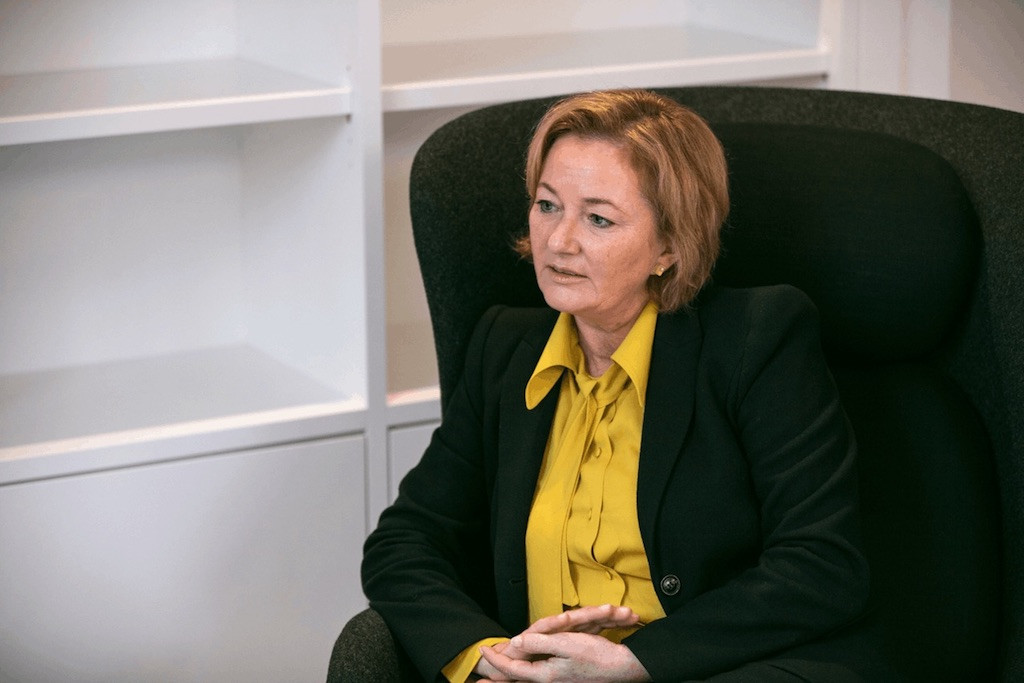Health minister Paulette Lenert (LSAP) has said she is delighted with the evolution of the coronavirus pandemic in Luxembourg, as it has allowed the grand duchy to enter a new phase with more freedoms. Lenert was speaking during a Paperjam Club live chat with Nathalie Reuter, director of editorial development at Maison Moderne, which published Delano.
But since no treatment or vaccine is expected in the short term, it will be necessary to get used to this “new normality” of social distancing and wearing masks. This will be a requirement “for a long time, at least until the end of the summer or autumn”, Lenert thinks.
This is especially true because if even a slight increase in the share of the population that has been in contact with the coronavirus were recorded--anything from between 2.08% and 2.65%, according to the studies--we remain far removed from herd immunity (which is estimated at around 70%), the minister said.
“We are not an island, we are enclosed by other countries where the virus is still present”
Further relaxation of confinement measures depends, then, on the evolution of the epidemic in the country, but also of the way it evolves elsewhere, Lenert also explained. “We are not an island, we are enclosed by other countries where the virus is still present, as in Belgium. So, we should not only look at the figures in Luxembourg, but at least at the levels in the Greater Region, and even Europe.”
And even if current figures show a positive trend, the possibility of a second wave cannot be excluded. To avoid this, we must “keep an eye on the virus… detect who is infected and be able to intervene as quickly as possible to isolate contact persons [and] act in a targeted way to break the chains of infection.”
Encourage testing
As well as the Convince study and sample testing in the sectors that have already been back at work, there is no shortage of other instruments to closely monitor the evolution of the epidemic in the country. But the voluntary large-scale testing project depends on the responsiveness of the population. “We need a lot of people to get tested so that the information base is sufficient,” the minister insists. She says that volunteering to get tested, when an invitation is received, is “acting for the good of the whole of society and the best way to avoid a new confinement.” More specifically, companies could face closure if there is an increase in the virus among its staff. “I can only encourage businesses to encourage their employees to get tested,” the minister said.
In the face of criticism from the opposition for the ordering a new generation of tests even before they were certified, the minister is adamant that she acted in good faith. “My decision was the right one, I would do the same thing again”, she said. “The market was tight, we were likely to see fewer tests and the opportunity might have passed. And the quality of the tests was guaranteed.”
Even if it is still too early to take a step back and analyse the overall performance of the government, Lenert believes that confinement measures were proportionate, “The containment was not too strict, it had to be done,” she said.
“The idea is to do better, not to be static, but to be dynamic.”
But a review of the pandemic plan will be necessary. “Some elements were missing,” Lenert admits. Work to improve preparedness is already under way, for example in increasing the national stock of equipment or medicines and improving supply chains. “The idea is to do better, not to be static, but to be dynamic.”
A new appreciation of the value of medical staff is also necessary, says the minister: “These professions must remain attractive. Fewer and fewer people are choosing to work in this sector, but we need these professions. I am thinking in particular of nurses. We will also have to increase the number of Luxembourg nurses, even if it is illusory to believe that we will be able to cope completely without frontier workers.”
The minister acknowledges that the crisis hit her “hard” as she had taken up her portfolio just a few weeks earlier. “There was so much action that I didn’t even really feel the stress.” This new phase will provide a little more respite, but she has to remain alert and puts things in perspective. “We feel that there is decompression. But the next phase is to be prepared, so there is still a lot of work to be done.”
This article was originally written in French for Paperjam and has been translated and edited for Delano.
